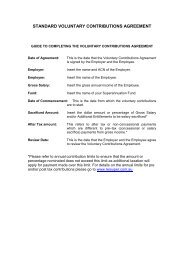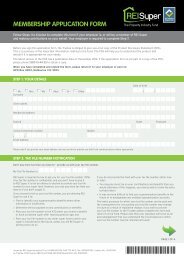Member Information Booklet - REI Super
Member Information Booklet - REI Super
Member Information Booklet - REI Super
Create successful ePaper yourself
Turn your PDF publications into a flip-book with our unique Google optimized e-Paper software.
estrictions on cash payments<br />
Generally, you can only receive your benefits in cash when you<br />
satisfy one or more of the following ‘conditions of release’:<br />
> You retire after reaching your superannuation ‘preservation age’;<br />
date of birth Preservation Age<br />
Born before 1/7/1960 55<br />
Born from 1/7/1960 to 30/6/1961 56<br />
Born from 1/7/1961 to 30/6/1962 57<br />
Born from 1/7/1962 to 30/6/1963 58<br />
Born from 1/7/1963 to 30/6/1964 59<br />
Born after 1/7/1964 60<br />
> You cease employment on or after age 60;<br />
> You reach age 65;<br />
> You die;<br />
> You suffer permanent incapacity (as defined in<br />
superannuation law);<br />
> You suffer severe financial hardship (you will need to satisfy<br />
the Trustee in relation to a number of criteria set down by<br />
superannuation law before any part of your preserved benefit<br />
can be released);<br />
> The Chief Executive Medicare [as defined under the Human<br />
Services (Medicare) Act 1973 approves the release of some or<br />
all of your benefits on compassionate grounds;<br />
> You are a temporary resident (apart from NZ citizens) on a<br />
particular type of visa departing Australia permanently.<br />
You may be able to cash out some of your superannuation<br />
earlier. For example, you can be paid your benefit in cash if you<br />
leave employment and the total preserved amount is less than<br />
$200. Similarly, your benefit statement may show an ‘unrestricted<br />
non-preserved’ component, which may be taken in cash at any<br />
time, or a ‘restricted non-preserved’ component, which may be<br />
taken in cash when you change jobs.<br />
page 7<br />
Choice of fund<br />
Under the Choice of Fund legislation, some employees can<br />
choose to direct their employer to pay their superannuation<br />
guarantee contributions to any complying superannuation fund.<br />
Your employer will advise whether you are able to make this<br />
choice.<br />
<strong>REI</strong> <strong>Super</strong> is the default fund under the Modern Real Estate<br />
Award 2010 and the Clerks Private Sector Award 2010. This<br />
means that if you do not nominate a fund and your employer<br />
does not have an alternative in place as set out in an enterprise<br />
agreement, your employer and employee super contributions<br />
will be paid to your account in <strong>REI</strong> <strong>Super</strong>.<br />
When you withdraw or transfer your money from <strong>REI</strong> <strong>Super</strong>, other<br />
than in circumstances where you are in receipt of a pension<br />
from the Fund, you will receive a lump sum benefit. This benefit<br />
will be reduced by a benefit payment fee (currently $90) for each<br />
withdrawal that you make, and any applicable tax. See ‘How<br />
super is taxed’ on page 23 for details.<br />
Should you die while you are a member of <strong>REI</strong> <strong>Super</strong>, the Trustee<br />
has absolute discretion in determining to whom your benefit will<br />
be paid. You can assist the Trustee by nominating a beneficiary<br />
or beneficiaries to <strong>REI</strong> <strong>Super</strong> (see ‘Payment of a death benefit’ in<br />
‘Insurance in super’ on page 30) and by keeping your Will up<br />
to date.<br />
If you keep your Will up to date, this can substantially assist the<br />
Trustee in exercising its discretion as to who receives your benefit<br />
as allowed by law and under the Trust Deed.





